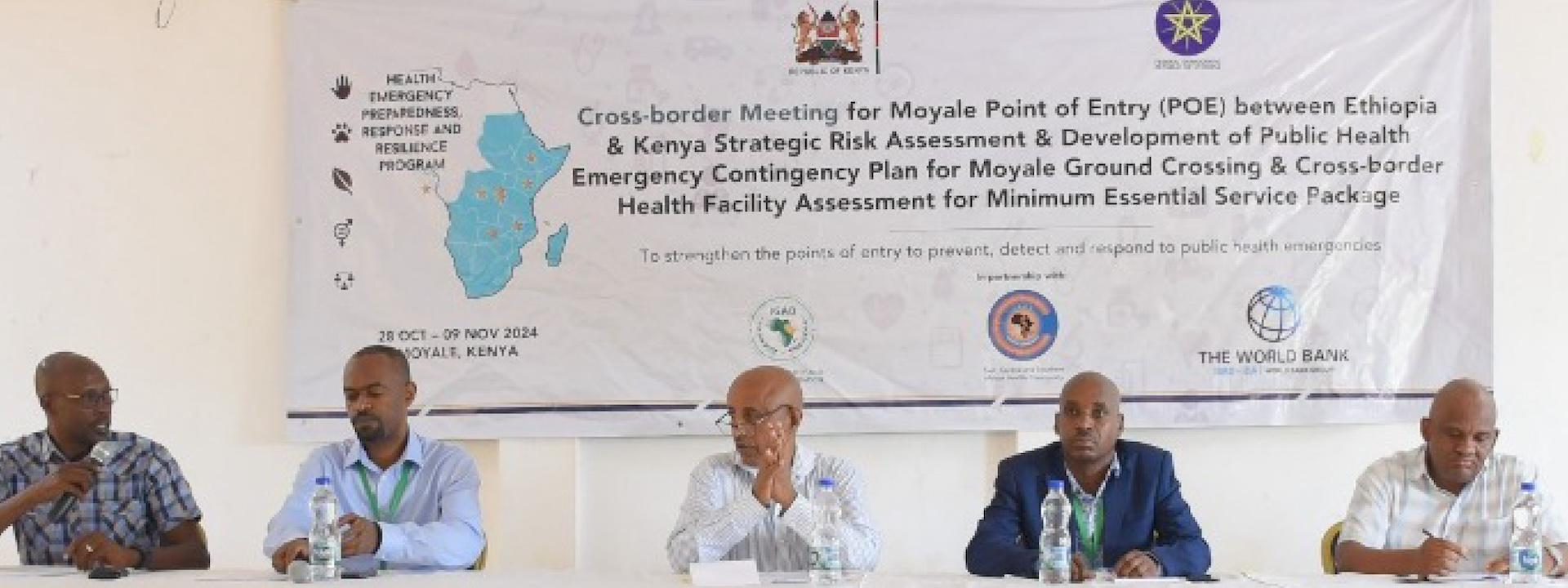November 10, 2024 (Moyale, Kenya): The Intergovernmental Authority on Development (IGAD) conducted the first cross-border meeting at the Moyale Point of Entry between Ethiopia and Kenya, focusing on health facility assessments for minimum essential health packages. This meeting is part of the Health Emergency Preparedness, Response, and Resilience Program for Eastern and Southern Africa (AFE), under Phase I of the Multiphase Programmatic Approach.
The primary objective of the one-day meeting was to strengthen border health facilities to prevent, detect, and respond to public health emergencies.
Speaking on behalf of Madam Fathia Alwan, Director of IGAD’s Health and Social Development Division, Dr. Tsegaye Legesse, Senior Coordinator for Health, noted that the meeting provided an opportunity to identify and characterize health hazards and develop effective mitigation measures. Dr. Tsegaye acknowledged the vital role of community leaders in supporting efforts toward disease prevention and control. He reminded participants of the importance of strengthening cross-border collaboration and praised IGAD’s continued support for cross-border health initiatives.
“I appreciate the extensive work done over the two-week meeting, which included strategic risk assessments and the development of the Multi-Hazard Public Health Contingency Plan,” Dr. Tsegaye expressed.
Dr. Benedict Mushi, a representative from the East, Central, and Southern Africa Health Community (ECSA-HC), highlighted that the strategic risk assessments conducted at Moyale (Ethiopia and Kenya) identified high-risk hazards that require joint interventions. Among these hazards are vaccine-preventable diseases such as measles and vaccine-derived polio. Dr. Mushi urged both countries to enhance collaboration and synchronise vaccination programmes for cross-border communities.
“ECSA-HC is committed to supporting cross-border initiatives in close cooperation with the IGAD Secretariat,” Dr. Mushi added.
In his opening remarks, Dr. Daniel K. Langat, Medical Epidemiologist and Head of the Division of Disease Surveillance and Response at Kenya’s Ministry of Health, emphasised the critical role of cross-border collaboration in enhancing the capacity to prevent, detect, and respond to public health events affecting both countries. He encouraged both teams to leverage support from regional institutions like IGAD and ECSA-HC to strengthen capacities, particularly in areas requiring joint efforts.
“It is time to move from planning to action. Both countries should now begin mobilising resources to implement the activities outlined in the Contingency Plan developed over the past two weeks,” Dr. Langat urged.
Mr. Temesgen Lemi, Director of the Travelers and Border Health Directorate at the Ethiopian Public Health Institute, highlighted that this contingency plan relies on the cross-border management committees of both countries to prevent and control communicable diseases.
“I call upon all border management committees, health officials, representatives from non-health sectors, and key partners to support this Border Health Initiative,” he stated.
The meeting included participants from Kenya and Ethiopia, including representatives from Port Health, the Disease Surveillance Unit, and various government bodies from both countries, as well as representatives from ECSA-HC and the IGAD Secretariat.
The meeting, funded by the World Bank, concluded successfully with recommendations for IGAD, ECSA-HC, and other partners to support both countries in implementing health security measures.
It is noteworthy that IGAD has held three cross-border meetings for the Moyale Point of Entry (PoE) between Ethiopia and Kenya. These meetings, held from October 28 to November 9, 2024, on the Kenyan side of Moyale, included a Strategic Risk Assessment, the development of a public health emergency contingency plan, and the assessment of minimum essential health packages for cross-border health facilities.

